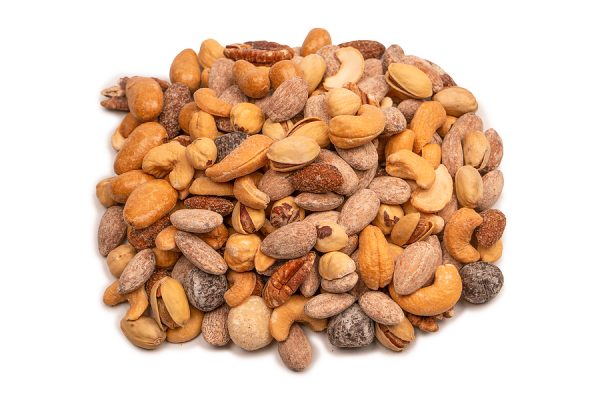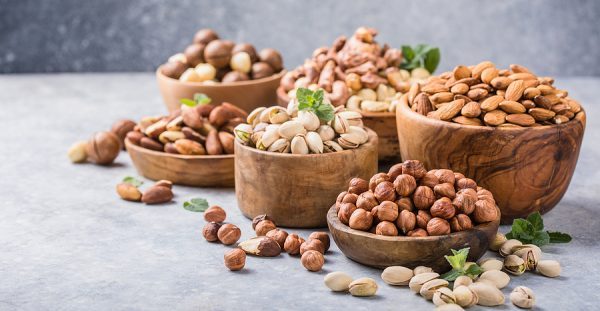I like nuts. They’re loaded with vitamins, minerals, antioxidants and other nutrients that fuel your body and protect against disease.
Nuts are especially good for your gut microbiome. That’s because they contain prebiotic compounds that support the growth of healthy gut bacteria. And what’s good for your gut is good for your entire body.
Nuts protect against cardiovascular disease, the development of type 2 diabetes and help control blood sugar. They’re great for fighting off dementia and Alzheimer’s. They battle cancer. And, despite the fact that many people believe they are fattening, they actually help people lose weight.
And now we’ve discovered that nuts can even help strengthen brainwaves.
Nuts Strengthen Brainwave Function
A study out of the Loma Linda University Adventist Health Sciences Center tested the effects of eating six types of nuts on brainwave activity. These included almonds, cashews, peanuts, pecans, pistachios and walnuts.
After eating the nuts, EEGs were taken to measure the strength of brainwave signals.
It turned out that, when eaten on a regular basis, all of the nuts helped strengthen brainwave frequencies, such as gamma and delta wave responses.
Gamma waves are associated with enhanced cognitive processing, learning, memory and perception. Delta waves, on the other hand, are associated with healing and deep REM sleep. They also help with the storage and consolidation of long-term memories while you sleep.
It appears we can thank the flavonoids in the nuts for these neuroprotective effects. These flavonoids accumulate in the hippocampal regions of the brain that are involved in learning and memory. They promote the formation of new neurons and the development of new blood vessels in the brain.
All of this has a positive effect on cognitive processing, recall, memory and other key brain functions.
The high antioxidant value of most nuts probably contributes to their effect on brain function. In addition to flavonoids, nuts contain a variety of other polyphenols, including proanthocyanidins and various phenolic compounds.
Studies show that polyphenols have the power to improve cognitive power and reduce the chance of age-related cognitive decline. And numerous studies on the consumption of nuts find they are associated with better brain function.
The total antioxidant capacity of nuts varies. From highest to lowest antioxidant value are: pecans, walnuts, hazelnuts, pistachios, almonds, cashews, macadamias, Brazil and pine nuts.
And by the way. Do you remember at the beginning of this article, where I mentioned how great nuts are for the gut microbiome? Well, a healthier gut microbiome is associated with enhanced cognitive performance, including learning and memory.
So as far as I’m concerned, there is absolutely no downside to adding more nuts to your diet. Eat them by the handful. Add them to salads and sprinkle them over veggies. It doesn’t matter what kind they are. Just mix and match them any way you want.
Surprise! The Nut that isn’t a Nut.
You might be surprised to learn that, despite their name, peanuts aren’t nuts. They’re legumes. That’s the same family peas, beans and lentils fall into. And peanuts come with a few problems that make me wary.
Peanuts are one of the biggest allergens you’ll find. They’re also high in lectins. These are specialized proteins also found in grains, dairy and plants in the nightshade family. Lectins are resistant to digestion and considered potentially toxic.
And there’s one more thing, too. Peanuts contain aflatoxin, a natural toxin produced by certain strains of mold. Aflatoxin is a carcinogen that’s been shown to cause cancer in rats.
So when you make your nut purchases, make sure to leave out the peanuts.
SOURCES:
Lamuel-Raventos RM, Onge MS. Prebiotic nut compounds and human microbiota. Crit Rev Food Sci Nutr. 2017 Sep 22;57(14):3154-3163.
Berk L, Lohman E, Bains G, Bruhjell K, Bradburn J, Vijayan N, More S, et a. Nuts and Brain Health: Nuts Increase EEG Power Spectral Density (μV&[sup2]) for Delta Frequency (1–3Hz) and Gamma Frequency (31–40 Hz) Associated with Deep Meditation, Empathy, Healing, as well as Neural Synchronization, Enhanced Cognitive Processing, Recall, and Memory All Beneficial For Brain Health. The FASEB Journal. 2017;31: 636.24-636.24.
Todorova R, Zugaro M. Isolated cortical computations during delta waves support memory consolidation. Science. 2019 Oct 18;366(6463):377-381.
Yang W, Cui K, Li X, Zhao J, Zeng Z, Song R, Qi X, Xu W. Effect of Polyphenols on Cognitive Function: Evidence from Population-Based Studies and Clinical Trials. J Nutr Health Aging. 2021;25(10):1190-1204.
Baroni L, Sarni AR, Zuliani C. Plant Foods Rich in Antioxidants and Human Cognition: A Systematic Review. Antioxidants (Basel). 2021 Apr 30;10(5):714.
Bolling BW, McKay DL, Blumberg JB. The phytochemical composition and antioxidant actions of tree nuts. Asia Pac J Clin Nutr. 2010;19(1):117-23.
Tooley KL. Effects of the Human Gut Microbiota on Cognitive Performance, Brain Structure and Function: A Narrative Review. Nutrients. 2020 Sep 30;12(10):3009.






